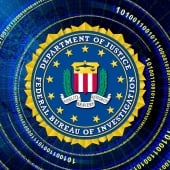By measuring the gravitational pull of water
for more than two decades, NASA satellites have peered beneath the
surface and measured changes in the groundwater supplies of the Colorado
River Basin. In a recent analysis
of the satellite data, Arizona State University researchers reported
rapid and accelerating losses of groundwater in the basin’s underground aquifers between 2002 and 2024. Some 40 million people rely on water from the aquifers, which include parts of Arizona, California, Colorado, Nevada, New Mexico, Utah, and Wyoming.
The basin lost about 27.8 million acre-feet of groundwater during the
study period. “That’s an amount roughly equal to the storage capacity
of Lake Mead,” said Karem Abdelmohsen, an associate research scientist at Arizona State University who authored the study.
About 68 percent of the losses occurred in the lower part of the
basin, which lies mostly in Arizona. The research is based on data
collected by the GRACE (Gravity Recovery and Climate Experiment) and GRACE-FO (GRACE Follow-On) missions. The data were integrated with output from land surface models, such as NASA’s North American Land Data Assimilation System, and in-situ precipitation data to calculate groundwater losses.
The conclusions were similar to those arrived at by Arizona State University Global Futures Professor Jay Famiglietti in an analysis
of the Colorado River Basin published in 2014, when his team was at the
University of California, Irvine. "If left unmanaged for another
decade, groundwater levels will continue to drop, putting Arizona’s
water security and food production at far greater risk than is being
acknowledged,” said Famiglietti, previously a senior water scientist at
NASA’s Jet Propulsion Laboratory and the principal investigator of both
studies.
The maps above underscore the accelerating rate of groundwater loss
detected by the GRACE missions. In the first decade of the analysis,
between 2002 and 2014, parts of the basin in western Arizona in La Paz
and Mohave counties and in southeastern Arizona in Cochise County lost
groundwater at a rate of about 5 millimeters (0.2 inches) per year.
Between 2015 and 2024, the rate of groundwater loss more than doubled to
12 millimeters (0.5 inches) per year.

Two key factors likely explain the acceleration, the researchers said. First, there was a global transition from one of the strongest El Niños on record in 2014-2016 to a period when La Niña reasserted control, including the arrival of a “triple-dip” La Niña between 2020 and 2023. La Niña typically shifts winter precipitation patterns in a way that reduces rainfall over the Southwest and slows the replenishment of aquifers.
Second, there was an increase in the amount of groundwater being used
for agriculture. “2014 was about the time that industrial agriculture
took off in Arizona,” Famiglietti said, noting that large alfalfa farms
arrived in La Paz and other parts of southern Arizona around that time.
Dairies and orchards in southeastern Arizona likely impacted groundwater
supplies as well, he added. Other “thirsty” crops grown widely in the
state include cotton, corn, and pecans. Data from the U.S. Department of
Agriculture’s Cropland Data Layer (CDL) shows that these crops are common in several parts of southern Arizona, including Maricopa, Pinal, and Cochise counties.
Irrigated agriculture consumes about 72 percent
of Arizona’s available water supply; cities and industry account for 22
percent and 6 percent, respectively, according to Arizona Department of
Water Resources data. Many farms use what Famiglietti described as
“vast” amounts of groundwater in part because they use a water-intensive
type of irrigation known as flood irrigation
(or sometimes furrow irrigation), a technique where water is released
into trenches that run through crop fields. The long-standing practice
is typically the cheapest option and is widely used for alfalfa and
cotton, but it can lead to more water loss and evaporation than other irrigation techniques, such as overhead sprinklers or dripping water from plastic tubing.

The satellite image above, captured by the OLI (Operational Land Imager) on Landsat 8,
shows desert agriculture in La Paz and Maricopa counties on July 12,
2025. CDL data from the U.S. Department of Agriculture indicates that
most of the rectangular fields around Vicksburg and Wenden are used to
grow alfalfa, while the fields around Aguila are typically used for fruits and vegetables,
such as melons, broccoli, and leafy greens. Some of the alfalfa fields
in Butler Valley (upper part of the image) have gone fallow in recent
years following the termination of leases due to concerns from the Arizona State Land Department about groundwater pumping.
The new analysis found some evidence that managing groundwater can help keep Arizona aquifers healthier. For instance, the active management areas and irrigation non-expansion areas established as part of the Arizona Groundwater Management Act of 1980 lessened water losses in some areas.

- The designation of a new active management area in the Willcox Basin
in 2025 will likely further slow groundwater losses.
- “Still, the bottom
line is that the losses to groundwater were huge,” Abdelmohsen said.
- “Lots of attention has gone to low water levels in reservoirs over the
years, but the depletion of groundwater far outpaces the surface water
losses.
- This is a big warning flag.”
NASA supports several missions, tools, and datasets relevant to water resource management.
- Among them is OpenET,
a web-based platform that uses satellite data to measure how much water
plants and soils release into the atmosphere.
- The tool can help farmers
tailor irrigation schedules to actual water use by plants, optimizing
“crop per drop” and reducing waste.
NASA Earth Observatory images by Wanmei Liang, using data from Abdelmohsen, K., et al. (2025), boundary data from Colorado River Basin GIS Open Data Portal, and Landsat data from the U.S. Geological Survey. Oceanic Niño Index chart based on data from the Climate Prediction Center at NOAA. Story by Adam Voiland.







.jpg)


 2
2



































